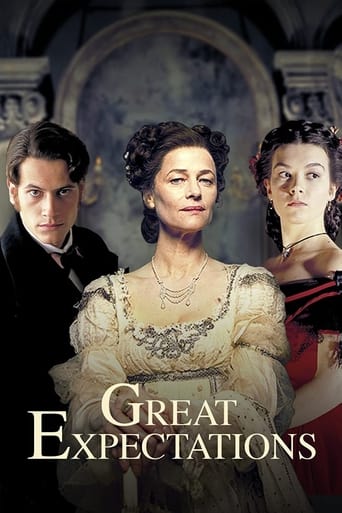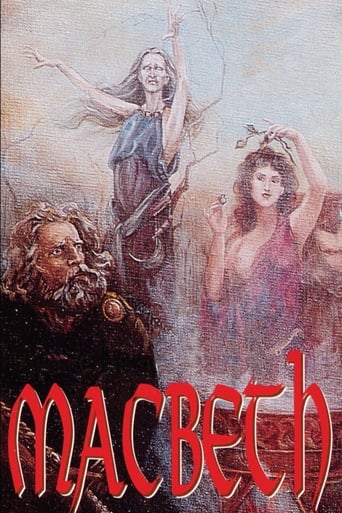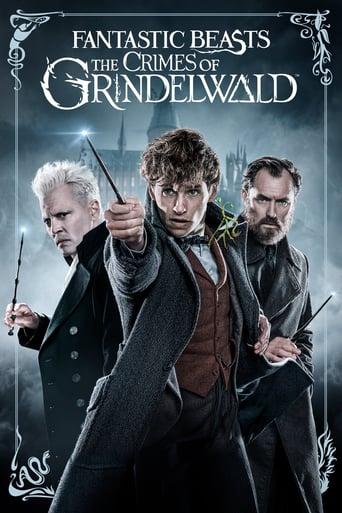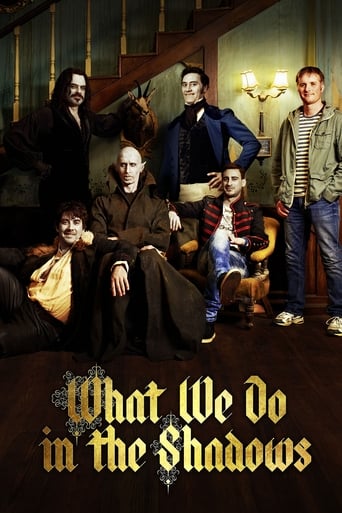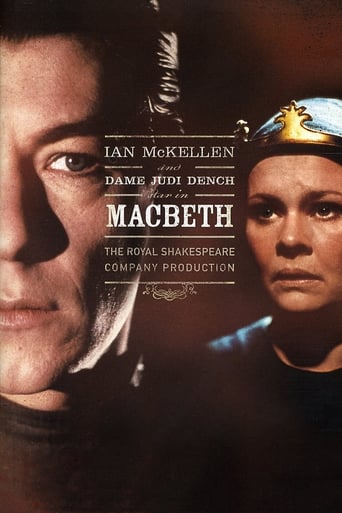


Macbeth
Macbeth is a 1978 videotaped version of Trevor Nunn's Royal Shakespeare Company production of the play by William Shakespeare. Produced by Thames Television, it features Ian McKellen as Macbeth and Judi Dench as Lady Macbeth. The TV version was directed by Philip Casson. The original stage production was performed at The Other Place, the RSC's small studio theatre in Stratford-upon-Avon. It had been performed in the round before small audiences, with a bare stage and simple costuming. The recording preserves this style: the actors perform on a circular set and with a mostly black background changes of setting are indicated only by lighting changes.
-
- Cast:
- Judi Dench , Ian McKellen , John Woodvine , Marie Kean , Ian McDiarmid , Bob Peck , Roger Rees


Reviews
Good movie but grossly overrated
This is a coming of age storyline that you've seen in one form or another for decades. It takes a truly unique voice to make yet another one worth watching.
Although I seem to have had higher expectations than I thought, the movie is super entertaining.
Exactly the movie you think it is, but not the movie you want it to be.
Most likely written for King James I, Macbeth is filled with references to witches, visions, dreams, ghosts, sleepwalking, and imagery of the supernatural. Professor Brian Levack of the University of Texas, has said, "Ever since classical antiquity, dramatists have used the theme of witchcraft in their literary works. The human exercise of mysterious or supernatural evil has always appealed to audiences and offers the dramatist numerous possibilities for character and plot development." Whether or not "evil witches" and witchcraft itself had any objective validity or were simply social constructs, they were part of the culture in which Shakespeare lived and his audiences were convinced of their reality.A TV production adapted for film in 1979, The Performance of Macbeth, directed by Philip Casson and Trevor Nunn, is one of the best on film. Marked by powerful performances by Ian McKellan as the ambitious Macbeth and Judi Dench as Lady Macbeth, the film is stripped down to its essentials without extraneous cinematic embellishments, but faithfully conveys the stunning poetry of William Shakespeare. The performance by Judi Dench was widely recognized as perhaps her best and she received a BAFTA nomination for Best Actress.The first witch scene introduces the reader to thunder and lighting and the mood of darkness is established. Although Shakespeare does not include any description of the three witches, their portrayals in the film as old hags foaming at the mouth would most likely have reflected the prevailing attitude of Shakespeare's times. The witches then plan their next meeting and agree to meet Macbeth upon the heath "When the battle's lost and won". They then depart and mysteriously chant "Fair is foul, and foul is fair",(Act 1, Scene 1) which is a major theme of the play. They are saying good is bad and dark is light which is part of the confusion principle they use to cause the downfall of Macbeth. The witches are gender neutral and have aspects of both male and female. Banquo says, "What are these / So withered, and so wild in their attire, / That look not like th' inhabitants o' th' earth / And yet are on 't?" (Act 1, Scene 3) Just like Lady Macbeth's association with the presumed male role of aggressiveness, ambition, and cruelty leads to madness, the witch's androgyny consigns them to villains in the play, leading the manly Macbeth astray. The witches confuse anyone who chooses to listen to their words. Perhaps after meeting them, Macbeth is being unconsciously motivated by evil to follow his deepest desires; whatever they may be. Psychiatrist and author Dr. Jan Ehrenwald posits in Macbeth published in the Journal of the Society for Psychical Research that "the witches grasped Macbeth's repressed wish by telepathy, so their prophecy is a reflection of his own secret hopes and ambitions, of his own unformulated sinister designs." Though undoubtedly, Macbeth was ambitious, this interpretation, however, is pure speculation and rather dubious considering the witches later prophecies in Act 4, Scene 1. In my view, despite Macbeth's attempt to prevent the realization of the witches' supernatural predictions, he came to accept them as fated or predestined to occur, not as wish fulfillment.Later, at the banquet in Macbeth's castle, Macbeth is haunted by the ghost of Banquo which is invisible to all but Macbeth. Shortly following Macbeth's change and the banquet scene, Hecate, a Greco-Roman goddess associated with magic and evil powers appears and plans on meeting the witches again so they can deceive Macbeth further. With her great wisdom and powerful occult magic, she plans to stir further confusion:"By magical sleights, Shall raise such artificial sprites As by the strength of their illusion Shall draw him on to his confusion He shall spurn fate, scorn death, and bear His hopes' bove wisdom, grace, and fear: And you all know security Is mortals' chiefest enemy" (Act 3, Scene 5)The most famous witch scene is, of course, the afore-mentioned Act IV, Scene 1, the "Double, double toil and trouble; Fire burn, and cauldron bubble" scene, where the three witches obtain the approval of Hecate. From this point on, Macbeth and his wife are stricken with insomnia and extreme paranoia. Meanwhile, the dark elements guiding Macbeth celebrate their victory. He believes the witches' prophecies and plans to fulfill the rest of their predictions even if he must influence the outcome himself. This also shows the beginning of the confusion that plagues Macbeth throughout the play. In referring to the words "mortals", it is now clear that Hecate and the other three witches are supernatural forces or demigods working under the powers of darkness. Macbeth has been erroneously dated to 1606 because of the reference to the "Doctrine of Equivocation" in the Gunpowder Plot. However, recent research has discovered that this Catholic doctrine was first enunciated both in 1583 and 1584, Though earlier plays such as Richard III depict the dark side of the supernatural, Macbeth is the darkest and may reflect the possibility that, in Macbeth, Shakespeare turned from the genial acceptance of the supernatural in A Midsummer Night's Dream to a growing recognition of the hidden evil in men. The Tempest, however, is Shakespeare's final reconciliation with the supernatural, whereby the ultimate act of magic is the renunciation of magic itself. Renouncing his powers, Prospero is able to connect with his true self.
I am an English/Drama teacher, I just showed this to my seniors. I admit there are few good versions of Macbeth on film. However, this made my skin crawl. After spending five weeks in class reading the play, my students actually enjoyed it and understood it. With Ian McKellan and Judi Dench, I was certain this would be top quality, but sadly I was wrong. The costumes were nonsensical. The actors moved between hideous over-acting and don't-care-just-pay-me-already-under-acting. I almost wondered if they were on some form of hallucinogenic drug while performing. I have never been more disappointed by something I thought spark further interest for the students. As someone who has directed Shakespeare, I understand the limited use of props and background, however the whole thing looks a bad early MTV music video. I expected Gary Neumann to come out and sing "Cars." Say what you want about the bizarre Roman Polanski version, at least that one is inspired by some form of creativity.
This is probably "Macbeth" as Shakespeare really saw it produced -- no fancy scenery, no elaborate sets, just stunning actors conveying everything Shakespeare intended to convey by the power of their own speech and actions.The defining moment for me is the banquet scene, where McKellan manages to go from icily cynical schemer to stark raving maniac on seeing Banquo's ghost, and then back again to schemer and then yet back again to broken, frightened shadow of a man by the end of the scene, without for a moment over-acting and without us, the viewer, even seeing Banquo's ghost.The only false note I think the production had was Judi Dench -- as others have said here, she is of course a splendid actress and her sleepwalking scene was wonderful. But part of what drives Macbeth in the play is Lady Macbeth's threat to withhold sexual favors and her denigration of his masculinity if Macbeth doesn't act more "like a man" and go through with the murder of Duncan (conveyed in this version by her avoiding Macbeth's attempted kiss in the "milk of human kindness" scene), and frankly in this production Dame Judi lacked the sex appeal that would make this viable.Still, a bravura performance and certainly the best Macbeth I have seen filmed.
The performance by Ian McKellen proves that he is one of the best Shakesperean actors ever (and I've seen all the famous ones on the stage). Macbeth is not a complex character, just a fine man sucked into a downward spiral by his ambitious wife, but Shakespeare gives him really magnificent poetry to speak (Tomorrow, etc.), and McKellen says it all breathtakingly. Actually, some of Macbeth's lines are very difficult to understand, and McKellen is capable of the ultimate actor's magic of making the lines seem quite understandable as he speaks them (they go back to being difficult when you contemplate them on the page). His representation of the descent into madness is extremely effective, even though he goes quite far in this. Exactly how psychotic Macbeth becomes is one important question in interpreting this character, and McKellen (and Trevor Nunn, who directed) decide to go all the way. The other actors are all adequate, no problem. Judi Dench is not entirely convincing as the evil-from-the-outset Lady Macbeth, really a caricature and not a fully developed person in the play (Shakespeare's fault, not Judi's). Dame Judi is just not an evil person, and can't make us believe she is. However, at the most crucial point, the sleepwalking scene in the last act which precedes her suicide, she rises to the occasion. Her wail in unforgettable. This was originally a stage production, done in the round with few props, fine for this play, which is about words (and faces), not about setting. It's great that someone had the idea of filming the stage production, and doing it so well that it's possible to watch it. For many years this tape has only been available to educational institutions for $250, so it's great that everyone can see such a stunning performance now. And its great that Ian McKellen has become better known through X-Men and Lord of the Rings (though it takes Shakespeare to display his true talents).

